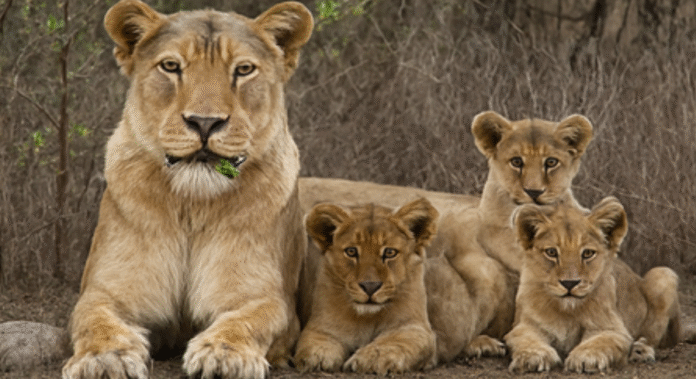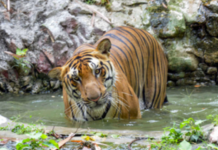AHMEDABAD– Once a royal hunting ground for the princely states of Porbandar and Jamnagar, Barda Wildlife Sanctuary—locally known as Bardo—has transformed into a thriving biodiversity hotspot and a rising model for Asiatic lion conservation in Gujarat’s Porbandar and Devbhumi Dwarka districts.
Declared a sanctuary in 1979, Barda is now at the forefront of efforts to expand protected habitats for the endangered Asiatic lion, in alignment with both state and national conservation goals. According to the 2025 census, the sanctuary is now home to 17 Asiatic lions, marking a major milestone in the region’s wildlife recovery story.
Covering 192.31 square kilometers, the sanctuary supports more than 260 species of mammals and migratory birds, including leopards, hyenas, jackals, sambar, nilgai, and chinkara. Its diverse landscape features rocky hills, seasonal rivers such as the Kilganga and Ghodadra, and culturally significant sites like Abhapara and Venu Hills.
A key breakthrough came in 2023, when a male lion naturally migrated into Barda following years of strategic habitat and prey base restoration. To support this pioneering male, the Gujarat Forest Department translocated five adult lionesses under strict scientific supervision. This led to successful natural breeding, officially designating Barda as a satellite lion population under Project Lion—the first of its kind within a fully protected zone.
Barda’s rich ecological profile includes over 650 plant species, many of which have medicinal value or are essential to the local food chain. Ongoing conservation initiatives also target the removal of invasive species like Prosopis and Lantana, the development of grassland patches, and the creation of breeding centers for key prey species such as chital and sambar.
The sanctuary also exemplifies human-wildlife coexistence, with more than 1,200 Maldhari families residing within its boundaries. Indigenous communities like the Rabaris, Bharwads, and Gadhvis maintain their traditional pastoral ways of life while actively participating in eco-development and conservation programs.
Efforts to align conservation with community welfare include voluntary relocation, veterinary camps, educational outreach, and livelihood support—fostering inclusive, sustainable growth.
To boost public engagement and eco-tourism, the Forest Department has launched the Barada Jungle Safari, which features trained local guides and visitor-friendly infrastructure including shelters, water stations, and interpretive signage.
This initiative not only generates employment but also enhances public awareness of conservation. Barda’s success reflects Gujarat’s progressive, science-based, and community-centric approach to wildlife management.
As the state’s lion population grows from 327 in 2001 to 891 in 2025, Barda stands as a testament to effective habitat restoration, species recovery, and the power of coexistence. (Source: IANS)














